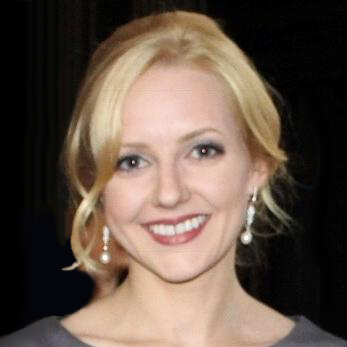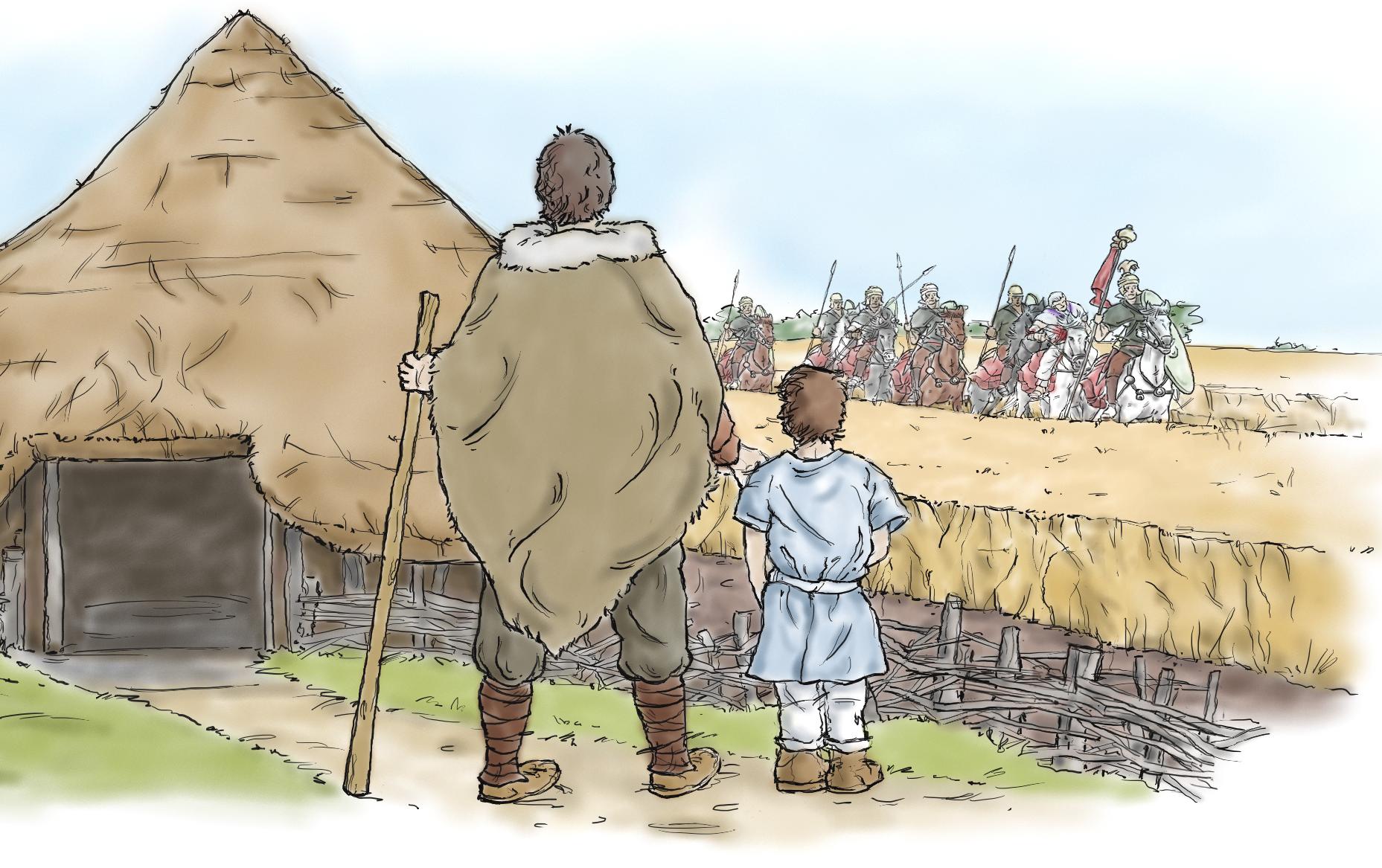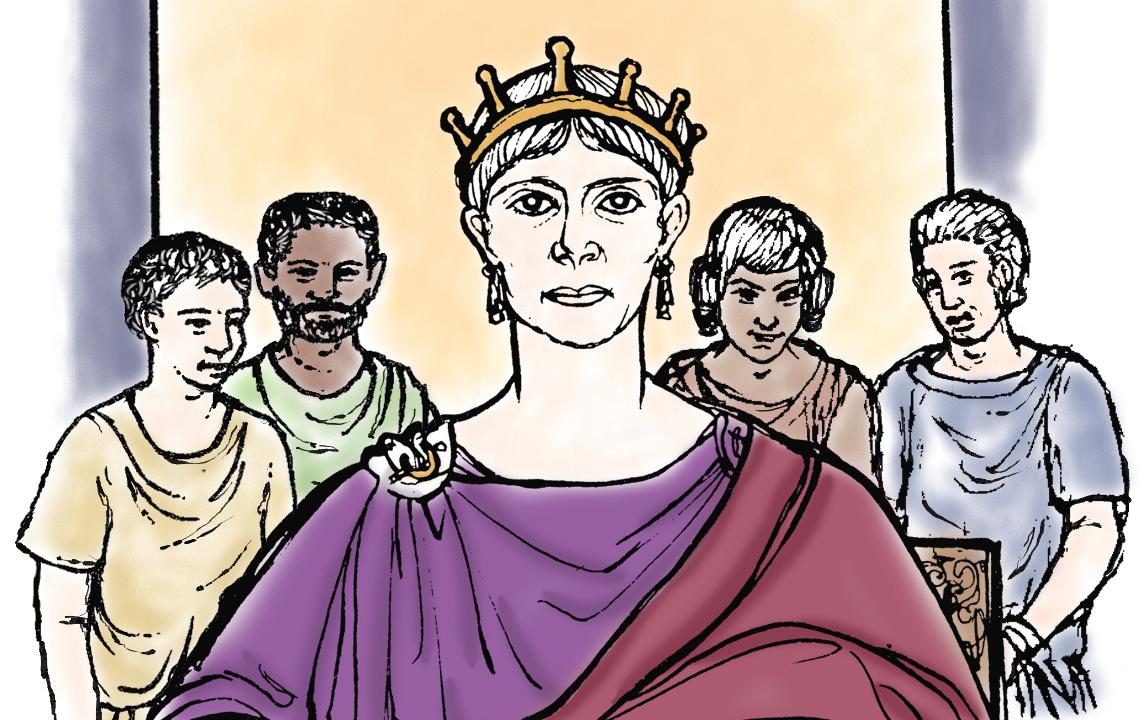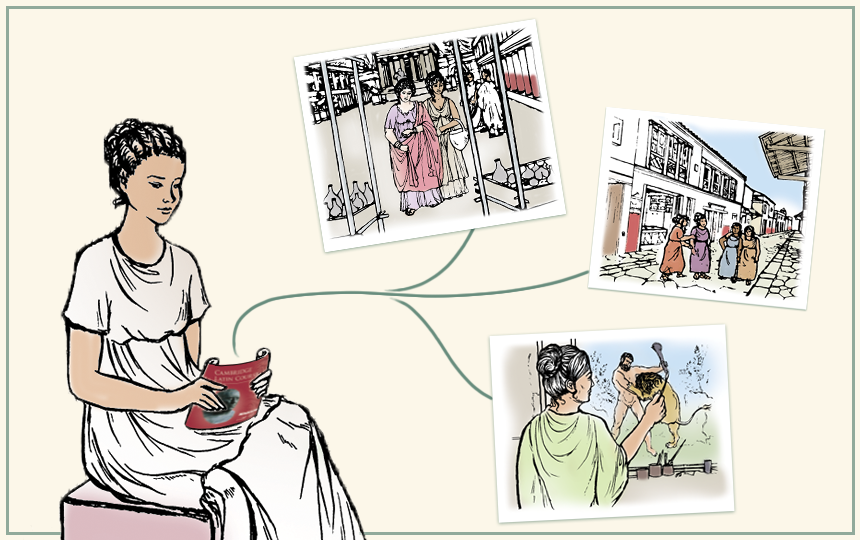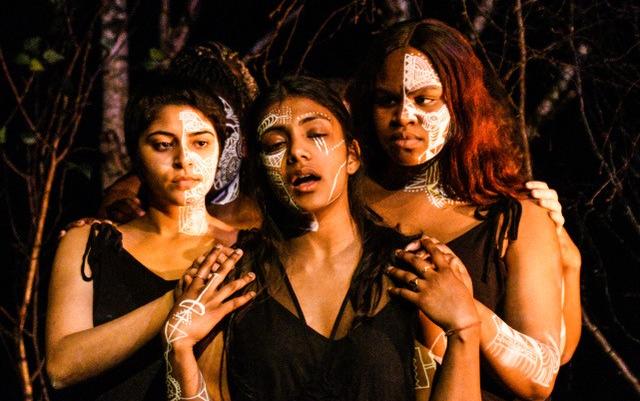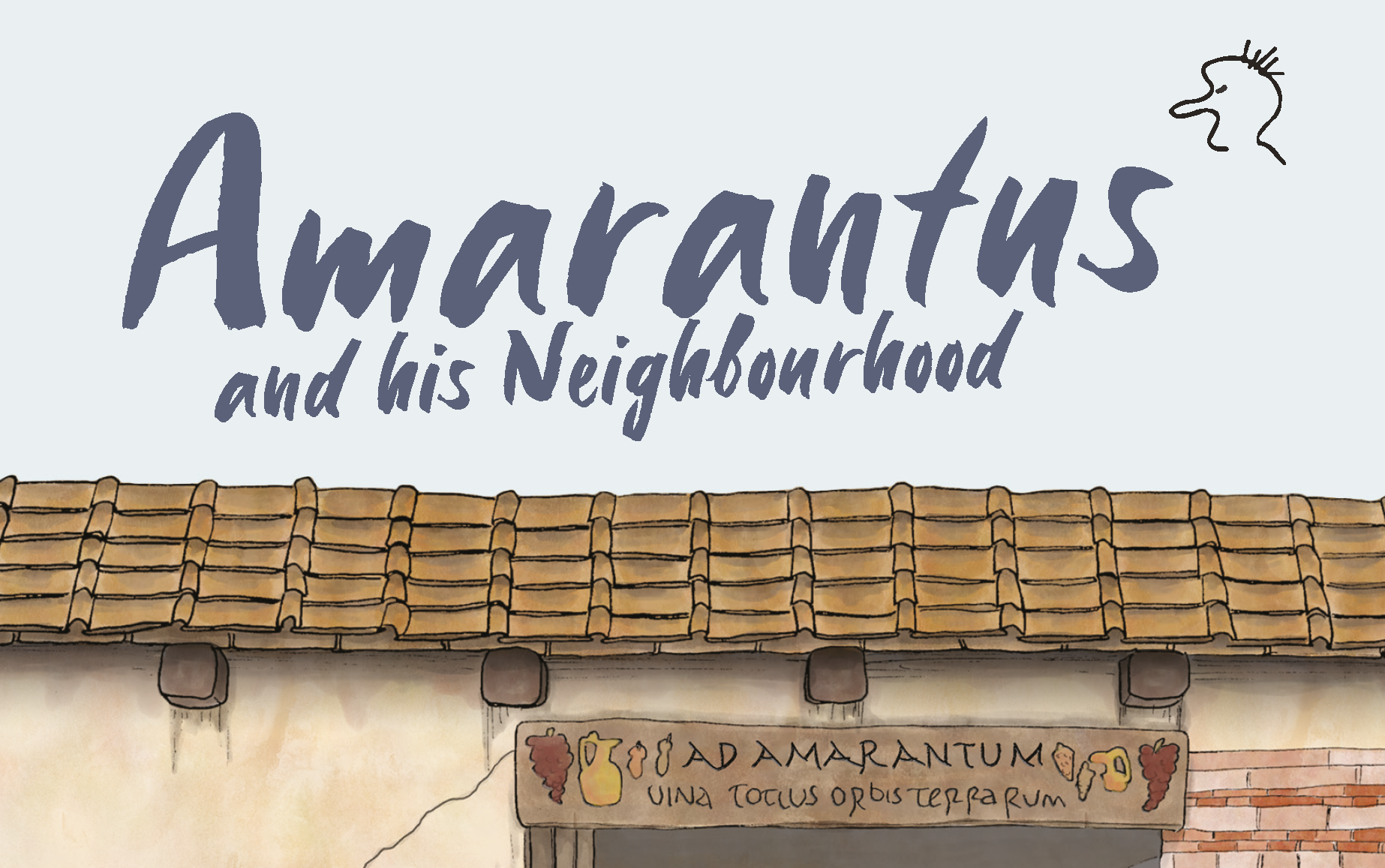Last year CSCP’s Caroline Musgrove met with Lottie Mortimer to chat about history pedagogy for the Classics classroom and Lottie’s work on the new edition of the Cambridge Latin Course. In this interview, Lottie discusses best practice in history teaching, what makes a good enquiry question and why it all matters, not just for schools but for the polarised and data driven world we live in today.
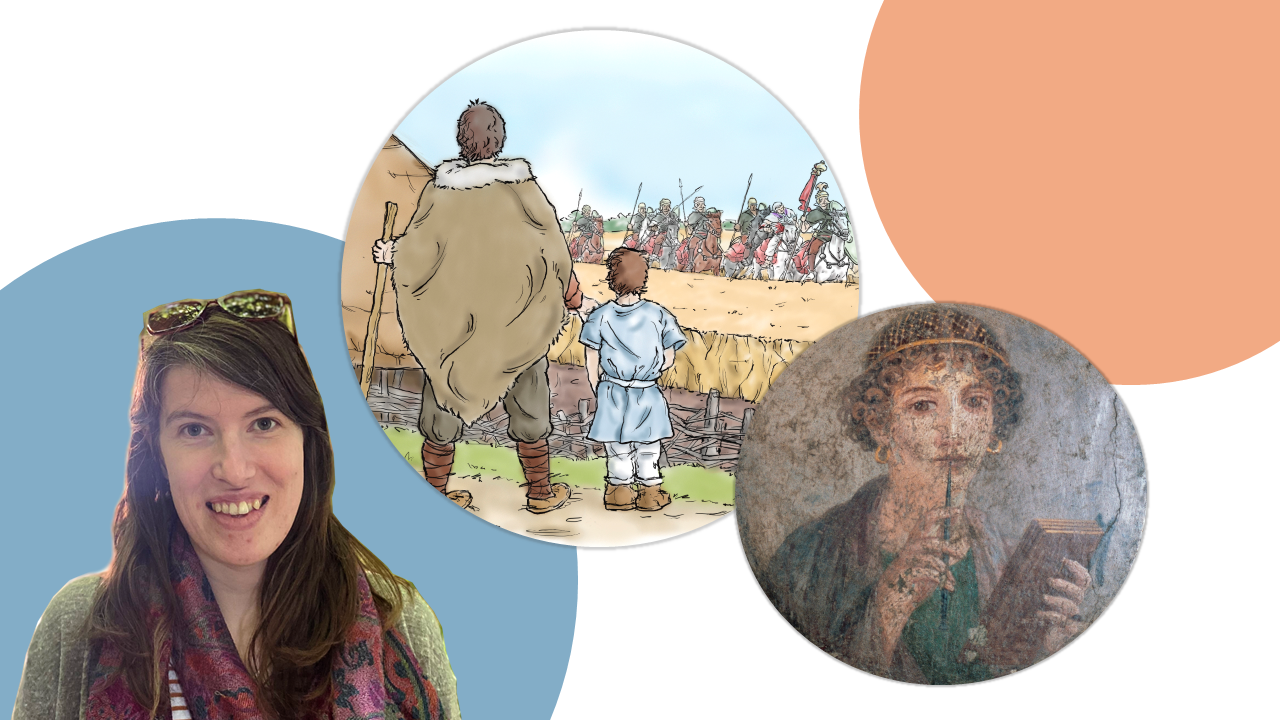
Submitted by Anonymous on Wed, 15/05/2024 - 11:59
Lottie Mortimer alongside a new illustration of the Romans arriving in Britain from Stage 13. The wall painting depicting a woman with a stylus and wax tablet is from Pompeii.
It’s 2018. Lottie has been a teacher for two years, and today she is teaching a set of lower prior attainers. They have just discussed the causes of the first crusade and considered excerpts of historical scholarship. Lottie had previously taught the students about medieval Baghdad, and she is witnessing some nuanced discussion. The class is finding the material exciting and are confidently expressing their opinions.
Not long after, Lottie teaches a Latin lesson with similar students. They are using Stage 8 of the CLC, considering the Roman arena and its gladiators, but something is missing. Her Latin students are not nearly as engaged, and Lottie is seeing none of the same excitement. “I just thought”, Lottie tells me, “this is really boring. I am getting so much more out of these students in my history lessons than I am in the civilisation sections of my Latin ones.”
For Lottie, this would become a turning point. “That’s the moment I thought: I am not doing the cultural background the justice it deserves.”
I thought: I am not doing the cultural background the justice it deserves.
Many of us have been there. We know in the Cambridge Latin Course that language and culture are part of a single whole. But time is short, the Latin stories seem like the stuff that really matters, and the cultural background frequently gets left until the end, an add-on rather than something fundamental. As Lottie explains, sometimes the easiest option is to make a worksheet or a set of top trumps cards. And while there is nothing wrong with either option, is there something more we can do?
***
To answer this question, it helps to consider how we got here. As a teacher with a PGCE in Latin and Classical Civilisation, as well as History, Lottie is well placed to hazard a guess. Part of the problem, she thinks, goes back to the origins of Classical Civilisation as a subject. When Oxbridge dropped Latin as an entry requirement in the 1960s, historical approaches to Classics came into their own. But while Latin had always been respected because of its perceived “difficulty”, Classical Civilisation was often considered an easy option. “Of course, I don’t believe it”, Lottie says, “but people do look down on Classical Civilisation”. And that’s not all. “We’re a much smaller subject community; we’re much more isolated”. This puts more pressure on individual teachers not only to teach well but often to justify “our very existence”, Lottie tells me.
Then there is the related problem of having a lack of good supporting resources. “History, I think, is one of the subjects where there is so much professional knowledge out there. The journal Teaching History is really strong with practitioner literature”. And while the situation is improving for Classics, Lottie explains, there is still “significantly more support for Latin” than for Classical Civilisation, despite exam entries for Classical Civilisation continuing to rise. Perhaps it’s no wonder, we speculate, that grades in the subject are not what we, as a community, might hope.
So, I ask, what is it about history pedagogy that makes it so promising for the Classics classroom?
“I think when you look at what’s going on in history teaching”, Lottie tells me, “teachers go back to what historians are doing. You’ve got a puzzle or a unit that doesn’t quite work and you go straight back to the scholarship. Teachers see what historians are doing, what questions they’re asking. We don’t do that with Classical Civilisation.”
History teaching is often framed around “second-order” concepts, Lottie explains. The historian’s enquiry question “takes an element of historical thinking – cause and consequence, change and continuity, similarity and difference, or significance - and puts it in the forefront of students’ minds.” The concept frames student engagement with the material from beginning to end.
Of course, Lottie warns, “you have to think very carefully about how this could work in your discipline. We can’t just take something from one subject and put it in another”.
We need to broaden our conversations: what is our subject? ... We need to make it worthwhile.
In short, there’s work to be done. “We haven’t done the professional thinking yet as a community”, Lottie says. “We need to broaden our conversations: what is our subject? It’s not about teaching stuff and having students answer questions on it. We need to make it worthwhile”.
***
The new edition of the CLC attempts to do just this with the cultural background sections. An enquiry question frames each stage and guides student engagement with the stories and the cultural landscape in which they unfold. Thinking points offer teachers the chance to pause and consider smaller details of historical interest or significance. By the end of a stage, students have had the opportunity to formulate arguments, evaluate evidence and think about second-order concepts of historical thinking, relating what they have read back to the world they are building through the stories.
But what is an enquiry question?
Long before the latest edition, Lottie was using them to structure the cultural background. Her favorite – and by far the most impactful – was one she wrote for Stage 6: “Should the CLC change the way it portrays Roman slavery?”
“That one was really exciting”, she tells me. “It completely transformed the way I taught that stage, because it got my students to consider the textbook as an interpretation. Textbooks have been created by someone. It got them to think much more carefully about the characters, how slavery is portrayed and the purpose of the book”.
It completely transformed the way I taught that stage, because it got my students to consider the textbook as an interpretation.
“There were some students who argued that you shouldn’t change the portrayal of slavery because it’s aimed at school children, so if you put in all the awful details, it might not be appropriate. I was getting all these nuanced arguments”.
Of course, this enquiry no longer works with the fifth edition in which the portrayal of slavery has indeed been changed (Lottie approves), but I am struck by how effective her approach is for inviting students to partake in historical narrative, dispelling the notion that a textbook is a static authority they cannot challenge.
So, an enquiry, Lottie says, “is not just a question, but a curricula planning tool. Michael Riley defines it as a genuine, meaningful, worthwhile historical question… ‘Worthwhile’ is important because there’s no point having a surface level question that doesn’t go anywhere. It’s a question that guides the thinking of the unit; that the whole unit is centred around”.
I ask Lottie if she has a particular favorite from the new edition.
“I like “How Roman was Roman Britain?” from Book II”, she says. “It’s an important one. I really like the idea of problematising the concept of ‘Roman Britain’ and all the things that can feed into it”.
“There are people who say we shouldn’t use the term, that it should be Britain in the Roman Empire. If you were to say “British India”, for example, that could be quite problematic”.
“We need to discuss colonialism and imperialism, and with a question like “How Roman was Roman Britain?” we can talk about the experience of the people who lived there, rather than about the Romans bringing roads and ‘civilisation’”.
And if Lottie had one tip for using the cultural background?
“Don’t leave it until your last lesson! Think about it throughout the stage. Most of the enquiry questions are good for the whole stage, and the stories were used to inform them. When you are looking at that title page, start thinking about your enquiry question then. Think about how the stories feed into it or what you can pick out. What do the characters tell us and what do we already know?”
Don’t leave it until your last lesson! Think about it throughout the stage.
Lottie’s own approach to developing enquiry questions for the new edition was much the same. “I thought about where this was all leading; what kind of question captures the content that is there”. And for those who are really intrigued about what the history classroom has to offer Classics, Lottie has a final piece of advice.
“Go to a history department meeting where they are planning a new unit and listen to the conversations they are having at curricula level. Curricula conversations are where the interesting insights happen”.
***
As we wrap up our conversation, I ask Lottie why she thinks historical skills are valuable.
She pauses and tells me the question has made her think back to her own school days. When she was in Year 11, she tells me, a student yelled at her teacher: “‘Sir, why are you a history teacher? Why do you teach history?’ And his answer was ‘to make you better people’”.
“That’s always stuck with me,” Lottie says. “I think about it quite a bit because of course history doesn’t make you a better person, but there’s something in it about understanding other people…”
“The more you understand other people and their perspectives, the better. You don’t have to agree with them, but even understanding the complexity of where their thoughts are coming from is important in a world where people are becoming so polarised, I think.”
And there’s more, Lottie says. “Ultimately history is important nowadays for understanding information, for source analysis, for provenance. I find myself thinking about it a lot, as we all do. You’ve got social media, you’ve got online news – there is just so much of it – and sometimes I have to stop myself and think, ‘now wait a minute, who has written this, where has this come from?’”
When we are overwhelmed with information and fake stuff, what is truth?
“That’s one of the most valuable things about history going forward. To get us to think about our information, whose stories we are telling, where we are getting them from, the reason they were written. When we are overwhelmed with information and fake stuff, what is truth?”
She pauses and considers a moment. “I think that’s where this is going to go,” she says.
Lottie Mortimer is a teacher of Classics at a girls' grammar school and leads the Ancient Languages Subject Knowledge Enhancement (SKE) course at the University of Sussex. She loves teaching Classics and History equally, but these days her teaching efforts are focused on Latin and Classical Civilisation. Lottie worked closely with the team at CSCP on the CLC 5th edition, generously lending her expertise in historical pedagogy to improve the cultural background sections and help formulate enquiry questions. Her favorite story in the CLC is fābula mīrabilis because who doesn’t love a good ghost story?
Want to learn more about historical pedagogy and the CLC? Check out this talk Lottie gave at the CSCP Conference in 2020, and this one for the CLC Twilight Series in 2022.
CLC illustration: Cambridge School Classics Project. Woman with stylus and wax tablet: National Archaeological Museum of Naples (inventory no. 9084).

